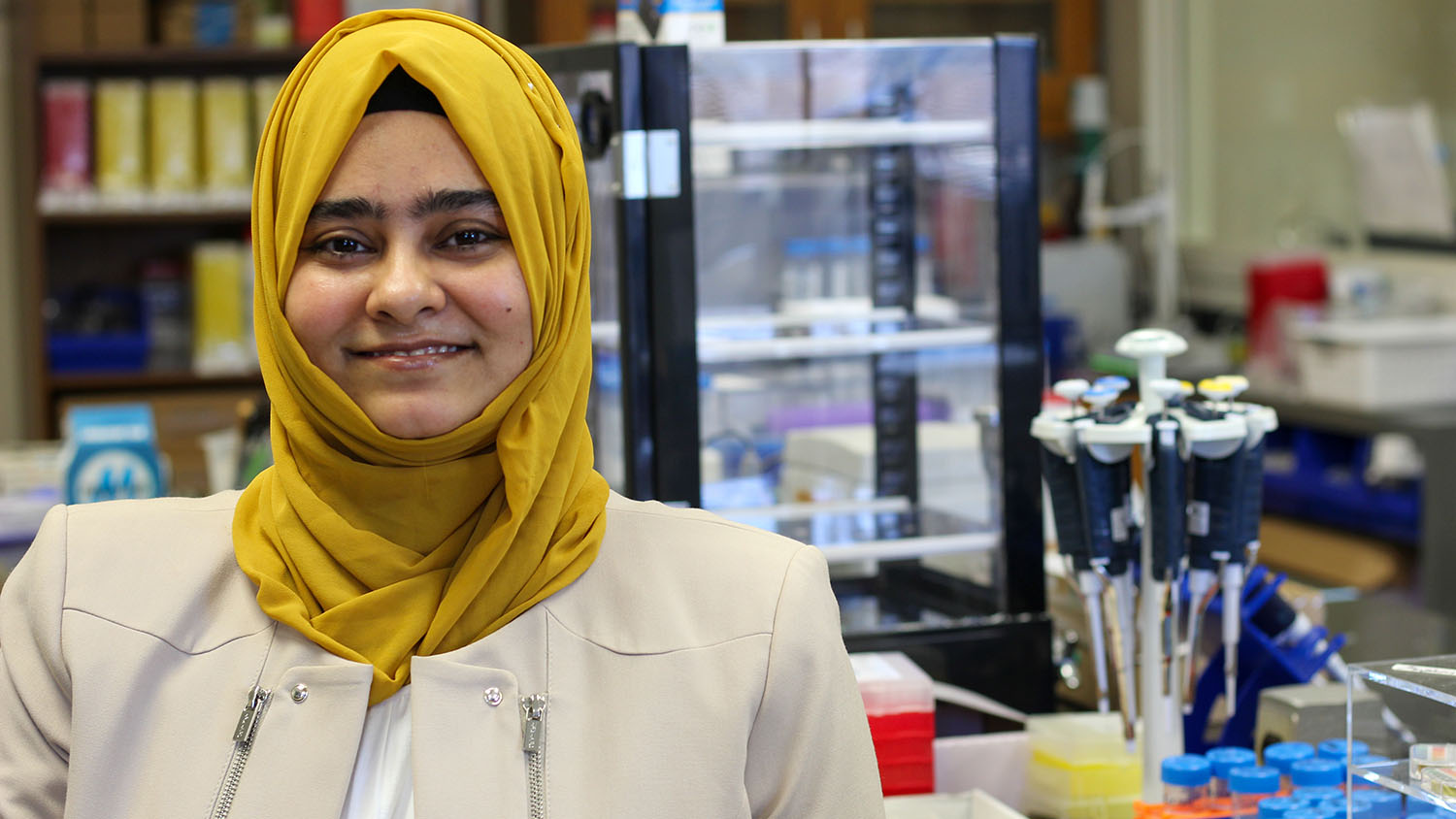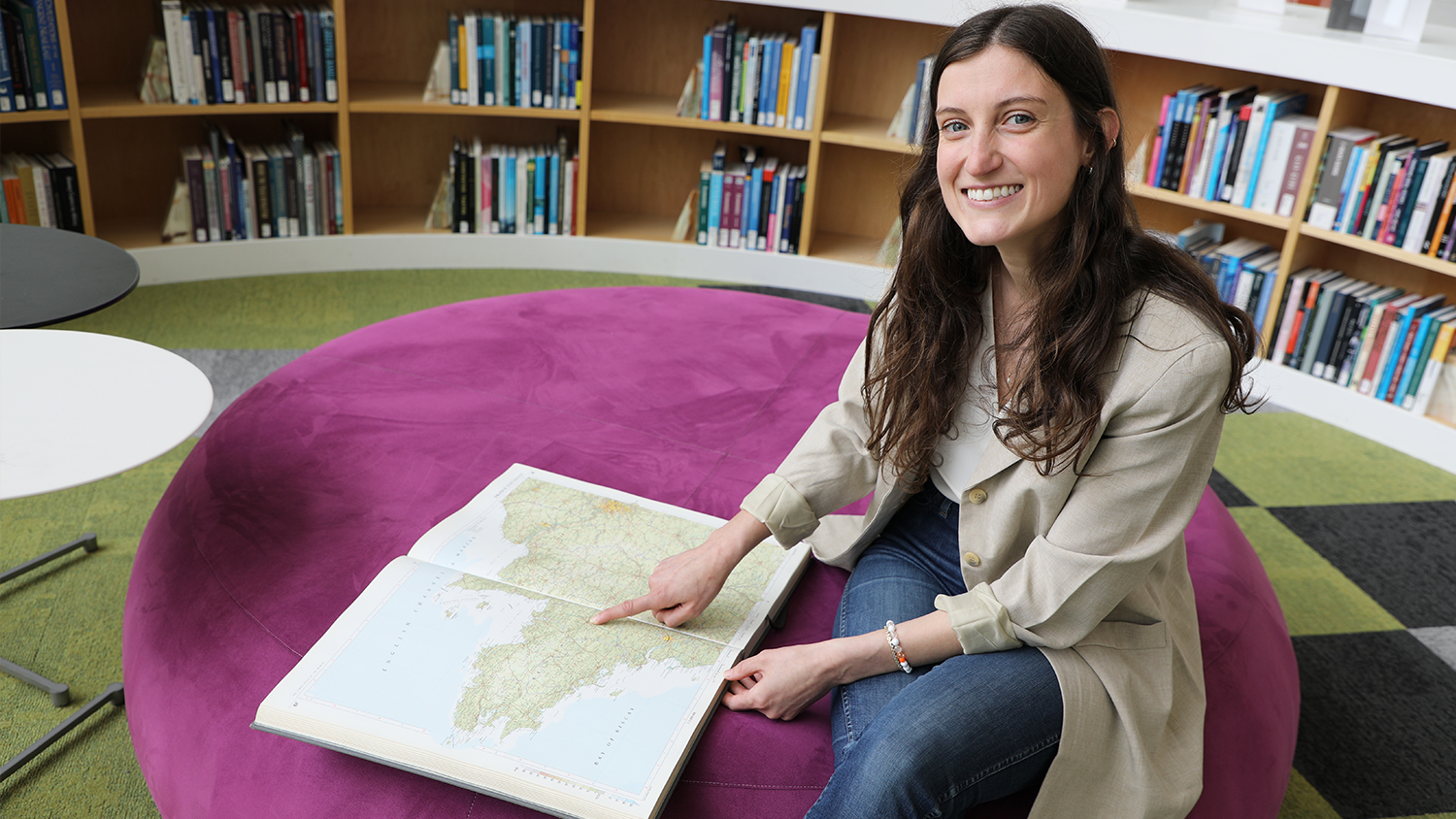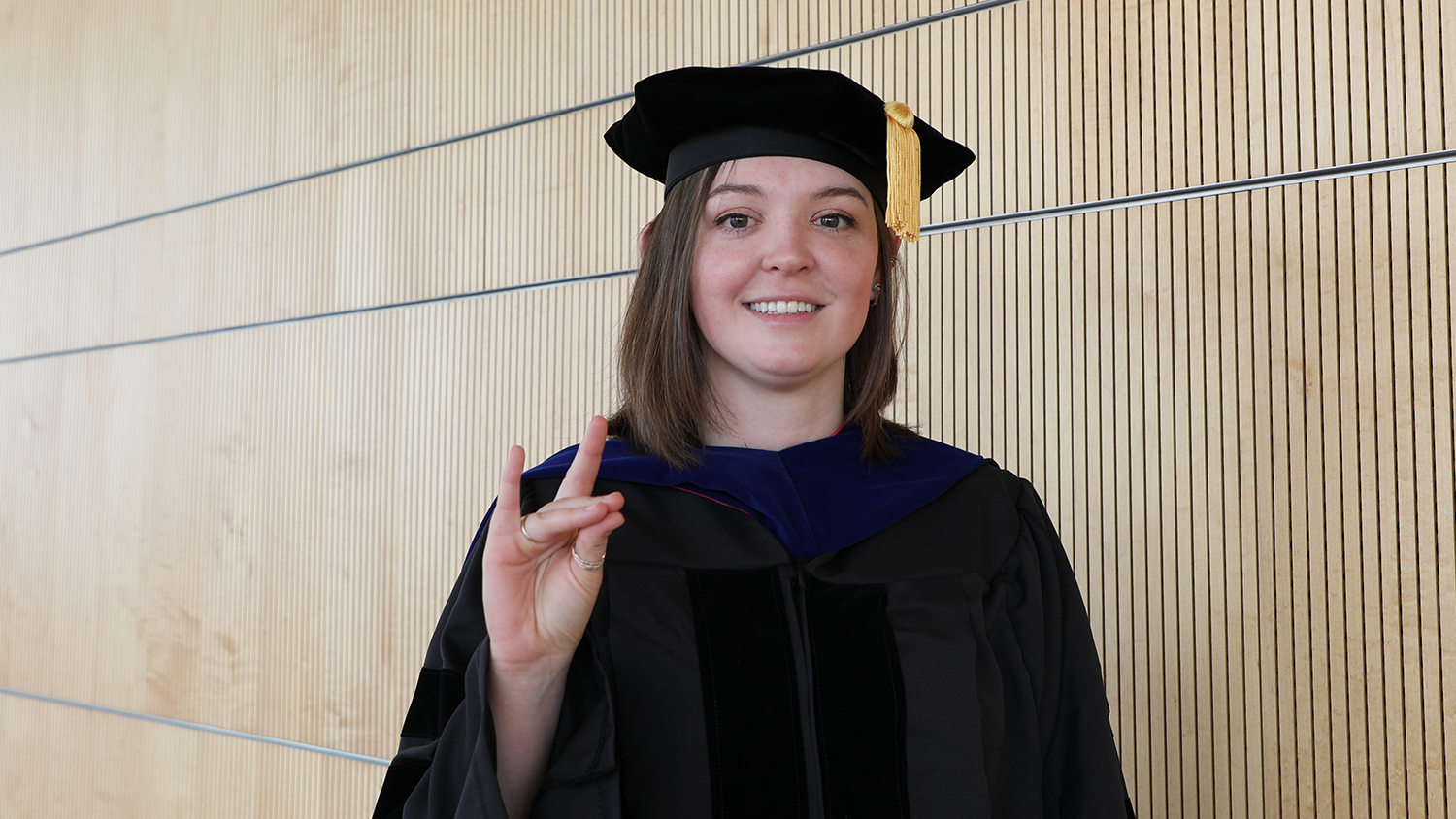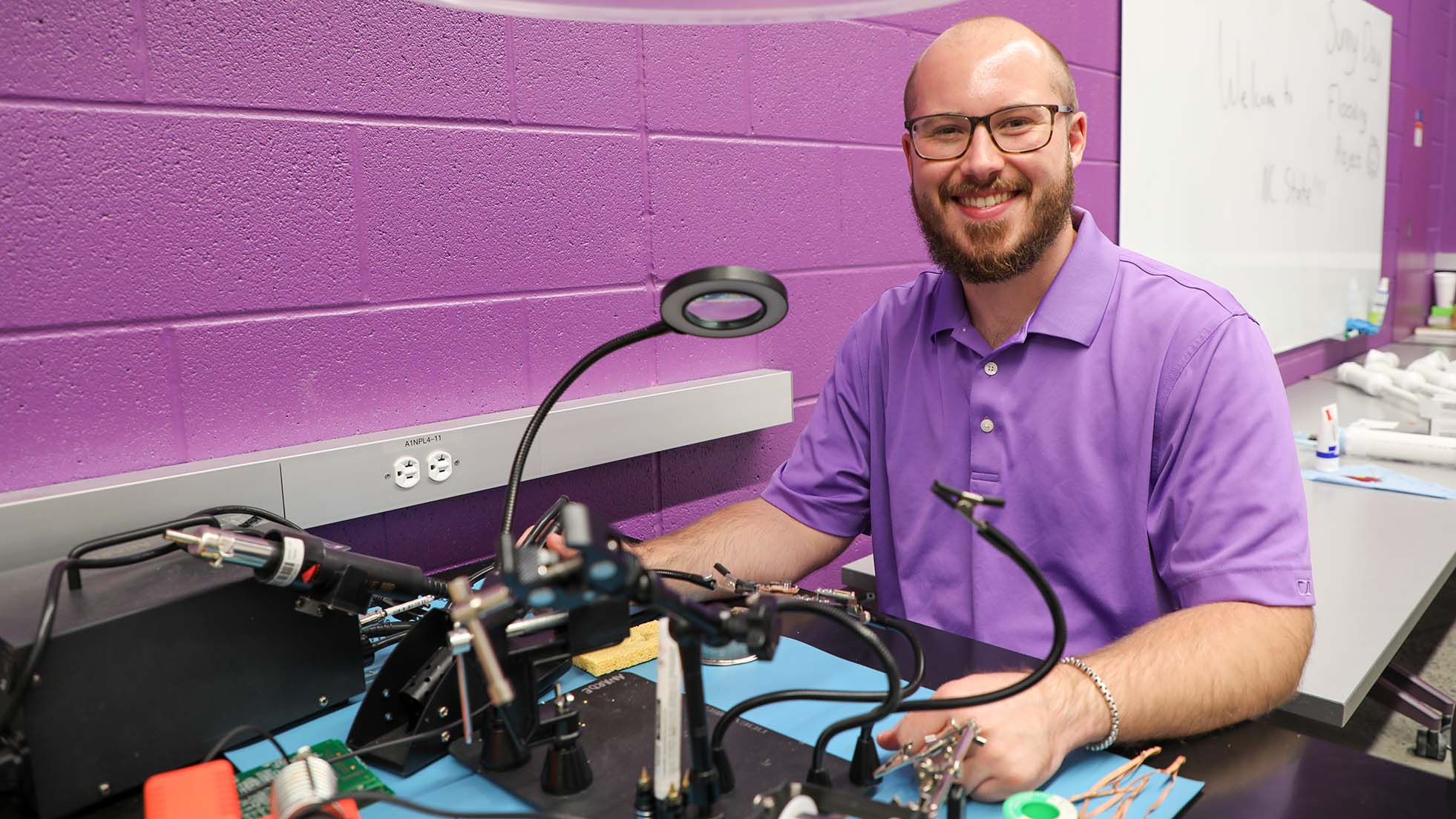Nigar Sultana, a fifth-year Ph.D. student in the fiber and polymer science program, is currently developing nanomaterial-based biosensors for biomedical applications. These biosensors are envisioned as non-invasive tools for detecting underlying diseases. Central to her research is the development of an optical pH sensor using carbon nanotubes, with potential applications in various fields, including disease diagnosis.
Sultana’s pioneering work on pH-based sensors was recently recognized by the Royal Society of Chemistry. Her research was highlighted as one of the top five outstanding works among 123 papers published in RSC Sensors & Diagnostics. Additionally, Sultana’s research gained international acclaim at the ECS (Electrochemical Society) conference held in Boston, MA, in 2023, where she secured the 2nd place in a global competition, further underscoring the significance and innovation of her work in the field of sensor technology.
Tell us about your journey to graduate school and what led you to NC State.
My journey to graduate school has been an interesting amalgamation of academic curiosity, a passion for problem-solving, and the pursuit of impactful research. Choosing the right institution was crucial for me, and that’s where NC State comes in. I was particularly drawn to the Wilson College of Textiles, which is recognized as the premier institution for textiles in the world. The excellence that permeates the department, both in terms of research and education, made it an obvious choice for me. I was not only looking for strong academic programs but also an environment that fosters innovation and real-world applications. NC State and the Wilson College of Textiles offer just that: world-class faculty, state-of-the-art facilities, and research opportunities that are second to none. Therefore, the decision to join NC State was easy, fully aligned with my career aspirations and academic goals.
Tell us about your research and/or teaching experience.
My research is focused on developing advanced pH sensors based on the optical properties of single-walled carbon nanotubes (SWCNTs). The core of this work aims to address a wide range of biomedical and environmental applications where accurate and reliable pH sensing is critical. We have successfully developed a pH sensor that can detect a pH range of 2-10, which is a considerable advancement in the field, offering more extensive applicability compared to existing solutions.
One of the significant milestones of our research is the establishment of a library for pH sensing using various surfactants or polymers. By tailoring the surface of SWCNTs, we have modified the sensor’s responsiveness towards pH changes, enhancing both sensitivity and selectivity.
Additionally, we’ve incorporated these SWCNT-based sensors into a hydrogel platform. The hydrogel-based sensors show promise for practical applications like wearable patches or as components in wound healing technologies. This development could revolutionize point-of-care diagnostics and personalized medicine, offering real-time, continuous data collection.
My team and I have spent considerable time studying the photoluminescence properties of SWCNTs, particularly how their chiral angles influence their characteristics. This deep understanding has enabled us to develop more accurate and efficient sensors.
My teaching experience has been comprehensive, involving active participation in traditional classroom settings. I have engaged in teaching, grading, updating course modules, and creating questionnaires. Parallel to this, my research role has encompassed significant mentorship, where I’ve guided younger researchers in the laboratory. I have instructed them on experimental design, data analysis, and conveyed the broader implications of our work on society and technology.
Overall, my research not only pushes the boundaries of fundamental science but also has direct implications for healthcare, environmental monitoring, and the economy, making it both a scientific and socially impactful endeavor.
How has the Graduate School and/or NC State helped you with your professional development?
The Graduate School and NC State have been instrumental in my professional development in multiple ways. First and foremost, the interdisciplinary approach adopted by the institution has provided me with a robust academic foundation. I’ve been able to work alongside experts in materials science, biomedical engineering, and chemistry, which has greatly enriched my research perspective and methodology.
Furthermore, the availability of state-of-the-art research facilities and laboratories has been invaluable in advancing my project work. From high-resolution microscopy to advanced spectroscopic techniques, the tools at my disposal have enabled me to explore novel research questions with a high degree of precision and accuracy.
Professional development seminars and workshops organized by the Graduate School have offered practical advice on career development, publication, and grant applications. These sessions have filled in gaps that traditional academic coursework often does not cover, preparing me for the rigors and expectations of a professional research career.
Another highlight has been the networking opportunities. Whether it’s the faculty members who have become mentors, the industry professionals I’ve met during events, or the peers who have become collaborators, the relationships I’ve built at NC State will undoubtedly have a lasting impact on my professional journey.
Lastly, the emphasis on outreach and communication skills has helped me understand the significance of making complex scientific research accessible to the general public, an essential skill in today’s fast-paced, information-savvy world.
In summary, the holistic educational experience at NC State has been much more than just academic enrichment; it has been a comprehensive program designed to mold well-rounded, competent professionals ready to tackle the challenges of the modern world.
What advice do you have for new or current graduate students?
Certainly, navigating graduate school is a multi-faceted journey that requires more than just academic prowess. Based on my experience, here are some pieces of advice for new or current graduate students:
Start with a Clear Vision: Have a clear understanding of your research goals and what you aim to accomplish during your time in graduate school. This vision will serve as your guiding light when things get tough.
Choose Advisors Wisely: Your advisor will be more than just a supervisor; they will be a mentor, a confidant, and a significant influence on your academic and professional life. Make sure to choose someone whose work you respect and with whom you can maintain a good working relationship.
Work-Life Balance is Crucial: It’s easy to get lost in the world of academia and forget about your well-being. Make sure to allocate time for your hobbies, family, and mental health.
Networking: Take advantage of conferences, seminars, and other opportunities to meet people in your field. Networking can open doors that you didn’t even know existed.
Interdisciplinary Skills: The more versatile your skill set, the more valuable you are. Don’t shy away from learning new methods or tools that could augment your main line of study.
Communication is Key: Whether it’s communicating your research to a lay audience or writing a compelling grant proposal, effective communication skills are as important as your research skills.
Accept Failure: Not every hypothesis will be validated; not every experiment will work. Failure is a part of the research process. What’s important is that you learn from it and move forward.
Time Management: This cannot be emphasized enough. Juggling coursework, research, and personal life requires excellent time management skills. Use tools and techniques to help you stay organized.
Seek Support: Never hesitate to ask for help, whether it’s from your advisor, your peers, or professional counselors. Graduate school can be overwhelming, and it’s entirely okay to seek support.
Enjoy the Process: Last but not least, try to enjoy your time in graduate school. It’s a unique period of your life where you get to focus so deeply on a subject you are passionate about. Take pride in the small victories, and don’t lose sight of why you started this journey in the first place.
Graduate school is not just an advanced degree; it’s an experience that will significantly shape your personal and professional life. Make the most of it!
What does being an NC State graduate student mean to you?
Being an NC State graduate student signifies more than just an advanced level of education for me; it represents a commitment to innovation, excellence, and collaborative problem-solving. The university’s emphasis on cutting-edge research resonates with my professional aspirations, providing an ideal environment to foster my growth as a researcher and an individual.
NC State is a place where interdisciplinary approaches are encouraged, offering a robust platform for gaining a comprehensive understanding of complex issues. The exposure to diverse perspectives from faculty and fellow students has enriched my academic experience in ways beyond textbooks and laboratories.
Furthermore, the sense of community at NC State is unlike any other. The collective drive to make meaningful contributions to society instills a sense of purpose and responsibility in me. The faculty’s dedication to student success and the availability of myriad resources for professional development make it clear that the university invests in its students not just as scholars but as future leaders in their respective fields.
To sum up, being a graduate student at NC State means being part of a dynamic ecosystem that values intellectual curiosity, social responsibility, and the pursuit of knowledge that impacts real-world challenges. It’s an honor and a privilege that I don’t take lightly, and I strive every day to live up to the high standards that being part of this community entails.
What are your plans after graduation?
After graduation, my goal is to transition into an industrial setting where I can apply the skills and expertise I’ve acquired throughout my academic journey. I am particularly drawn to roles that require problem-solving, team collaboration, and the application of scientific principles to real-world challenges. Whether it’s in product development, research and development, or technical consulting, I am eager to contribute to projects that have a tangible impact on society.
While I have enjoyed the depth of focus and specialization in academia, I am excited about the broader and more immediate applications that industry offers. I believe my strong analytical skills, coupled with the ability to work cross-functionally, make me well-suited for a career in industry.
Long-term, I envision myself growing into a leadership role where I can guide and inspire a team to innovate and tackle challenging projects. Regardless of the specific industry I find myself in, the ultimate goal is to work on projects that are not only commercially successful but also contribute positively to the well-being of communities and the environment.
Fun fact about yourself.
I’m quite a culinary enthusiast and love to explore different cuisines through cooking. When I’m not in the lab or engrossed in research, I usually experiment with new recipes in the kitchen. I also have a passion for travel and have visited several new places. But what truly keeps me grounded is spending quality time with my family and friends. These interests enrich my life and provide a well-rounded balance to my academic pursuits.
- Categories:




Nigar,
I cannot express how happy, excited, and proud I am of you and for you!! Your research is groundbreaking and will help humanity for years to come. I’m truly bowled over by what you are doing.
I’m so glad you found your “place” and are flourishing there.
The future holds so much promise for you and I’m looking forward to seeing your bright light shine, Nigar!
Diane